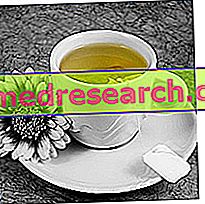Insomnia is a widespread sleep disorder, characterized by difficulty in falling asleep, early or too frequent awakenings, or an inversion of the sleep-wake rhythm.

The fact that insomnia is so widespread (after the age of 60 affects 50% of women and 30% of men), drives many people to consult the herbalist to find natural remedies that help them sleep peacefully. The medications prescribed by the doctor, in fact, are often burdened by side effects that are certainly not negligible; the most common, benzodiazepines (midazepam, flurazepam), create psychic dependence and cause a certain degree of mental confusion, drowsiness and retrograde amnesia; azapironi (buspirone), on the other hand, cause headache, dizziness and a "sense of light head"; finally, the B-adrenergic antagonists (propanolol) have side effects such as bronchoconstriction, arrhythmias and metabolic disorders. In this regard, see the general article on hypnotic-sedative drugs.
Good habits that help you sleep
- carry out regular daily physical activity, avoiding intense psycho-physical efforts in the hours before rest;
- limit as much as possible the consumption of nervine foods (coffee, anorectics, strong tea) and alcohol;
- to make the environment in which you rest comfortable, isolating it as much as possible from external noise and keeping it in the appropriate temperature and humidity conditions;
- get up early enough and go to sleep by midnight;
- dinner should be a light meal; more generally, avoid binges or the consumption of foods that are difficult to digest in the 3-4 hours preceding sleep;
"You will prepare your herbal tea in the evening before going to bed, pour it into a cup and drink it steaming sweetened with honey; in this way you will have the certainty that it will not break you down, it will never cloud your mind, it will never leave you dazed awakening and will never have any side effects typical of some hypnotic drugs . "
Dr. Amalia Rocca Della Rovere
Herbal teas for better sleep
For the list of useful medicinal plants against insomnia see the dedicated article.
Here, remembering that this sleep disorder can recognize various causes of origin, we propose two useful teas to sleep better, indicating the physio-pathological context in which they are most suitable.
Herbal tea for sleeping - 1 | |
| Chamomile (flower heads) | 50 g |
| Common Hawthorn (flowers) | 20 g |
| Wild linden (flowers) | 20 g |
| Bitter orange (flowers) | 10 g |
This tea against insomnia must be obtained by infusion and not by decoction. The use and the dosage foresee that the boiling water is poured on the preparation, then letting the infusion rest for a few minutes in a covered container; normally a spoonful of preparation is used per cup, to be taken just before bedtime when the drink is still hot. It is a useful herbal tea for treating anxiety syndromes and forms of nervousness. It is particularly indicated for treating states of nervousness complicated by heart palpitations, insomnia, states of anxiety, and excitement due to physical and intellectual surmenage with cardiac eretism. | |
Herbal tea for sleeping - 2 | |
| Valerian (root) | 40 g |
| Hops (cones) | 20 g |
| Melissa (leaves) | 15 g |
| Mint (leaves) | 15 g |
| Orange (rind) | 10 g |
This tea against insomnia must be obtained by infusion and not by decoction. The use and the dosage foresee that the boiling water is poured on the preparation, then letting the infusion rest for a few minutes in a covered container; as a rule, one tablespoon of preparation per cup is used (5% infusion), to be taken just before bedtime when the drink is still warm. This herbal tea for sleeping is indicated in states of agitation and difficulty in falling asleep of nervous origin. | |



